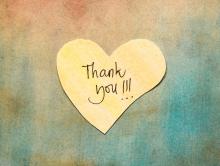gratitude
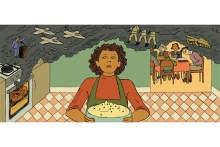
WE HEAR A lot about gratitude as both spiritual practice and a boost to our mental health. But I confess: Lately I’ve caught myself asking what, exactly, is there to be so thankful for?
In the U.S., Thanksgiving is upon us. We are expected to be thankful and celebratory. In the face of so many national and global crises, however, feeling gratitude can be challenging. Authoritarianism and political violence are rising in the United States. Preventable suffering and death around the world are surging due to ongoing war in Ukraine, the Middle East, Sudan, and beyond and the Trump administration’s dismantling of foreign assistance programs for health and food security.
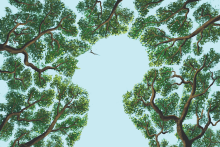
AT THANKSGIVING, MILLIONS of us across the country gather around tables. Gratitude will be expressed for blessings both great and small, which indeed is an opportunity to trace the goodness that enfolds our daily lives. Gratitude is one of the more ancient practices of our human society. It has long been observed across different religions, researched in the field of psychology, and mused over by philosophers. Orator and philosopher Marcus Tullius Cicero wrote, “Gratitude is not only the greatest of virtues, but the parent of all others.”
One of my most formative perspectives on gratitude comes from Indigenous practice. Indigenous cultures in the Americas have observed collective practices of gratitude that have long preceded our legislated day of thanks. The Haudenosaunee Confederacy, also known as the Iroquois or the Six Nations, have a daily Thanksgiving Address recited by school children just before classes begins. This is a practice author Robin Wall Kimmerer calls “an allegiance to gratitude.” The address uses gratitude to trace life-sustaining provision to the Creator, to the community, and to every food and water source, through every plant, every creature, and even the land itself. Gratitude is essentially ecological this way.
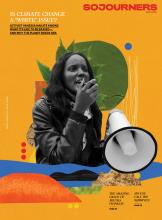
Activist Vanessa Nakate on Jesus, erasure, and the climate crisis in the Horn of Africa.

Gratitude is far more radical than slapping a #blessed hashtag on a social media post. When we give thanks, we are invited to build a beloved community that aligns with our enduring moral values of justice, peace, and love for our neighbors.

IMAGINE AN UNLIKELY DUET. One singer is National Review senior editor Jonah Goldberg, a conservative political columnist who admits he indulged in “smash-mouth” rhetoric and once did a video mocking “social justice” as meaningless mush. The other is religion scholar Diana Butler Bass, a progressive liberal and author who champions social justice as central to a life of faith. Both published books this spring, and as they made separate media rounds, they sang the same song—an ode to gratitude.
Gratitude is having a big turn in the spotlight right now as influential writers, university researchers bolstered with millions in foundation grant funds, #blessed social media mavens, and more tout thankfulness as a boon to one’s spirit and health.

Many people of faith want to follow the imperatives of Scripture, to care for the poor and marginalized, to work against systems of oppression and to build up generosity, rather than wealth. And the needs of the world and of our neighbors are more urgent than ever.
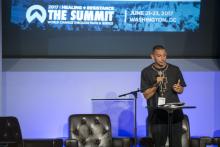
Here at Sojourners, we are excited to share that Rev. Adam Taylor has returned to the organization to serve as Executive Director. Both Adam and Sojourners Founder Jim Wallis shared some reflections on this transition in a recent columnwelcoming Adam back, and we also wanted Adam to offer a few words with you, our beloved community of supporters.
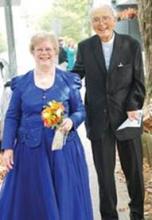
For all of us at Sojourners, there are no words to adequately express our gratitude for this fellow Sojourner. He walked with us, prayed with us, laughed with (and at) us, and generously supported our mission. He shared with us everything he had, especially the treasure of time. We thank God for granting us the privilege of sojourning alongside our brother in Christ. We also give gratitude for his partner and caring wife Barbara Besse. We surround her and her children with prayers of comfort, peace, celebration of a life well-lived, and space to grieve the loss of Alden’s presence on earth.
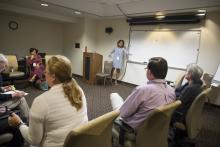
As one who enjoys the benefits of privilege in today's world, I felt it important to submit my own sense of what is just and right to other perspectives, especially other perspectives that are informed by biblical witness and the Christian gospel. The 2017 Summit represented that sort of challenge for me.

Gratitude, say religious leaders from many traditions, is one of the most important spiritual disciplines for a whole and healing life. And the discipline of remembering what and who you are most grateful for is especially important in difficult and even dangerous times like these. There are gratitude prayers, meditations, and walks, which focus our minds and hearts on the things and people we are most thankful for when we are most easily conscious of the things and people who make our times most difficult and even dangerous.
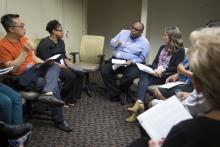
Editor’s Note: The Summit: World Change Through Faith and Justice is one of the powerful opportunities Sojourners has as an organization to bring together 300+ of our leaders together to deepen relationships and build more intersectional movements. The following series of posts offer reflections from participants to offer a glimpse of the experience. We are grateful for the ways you make this gathering possible. Our first reflection comes from JoAnn Flett, director of Eastern University's MBA in Economic Development and the facilitator the Summit’s 2017 Business Convening.
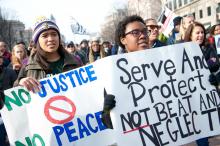
There is change for racial justice and equity in the air in Boston, to an extent that I previously only hoped for but could not heretofore have envisioned. And as I look ahead to attending Sojourners’ upcoming leadership Summit, which focuses on the intersections and implications of race across numerous justice issues, I expect and pray for change to be in the air in D.C., and that the same winds may fill our sails in June.
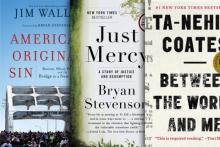
Editor’s Note: We’ve had the privilege of connecting with many members of the broader Sojourners community (including some of you reading this!) during Sojourners President Jim Wallis’ America’s Original Sin book and town hall tour. Our conversations in cities like New York, Baltimore, Chicago, Atlanta, Los Angeles, and Portland are serving as a tool to engage people – particularly people of faith and white people — more robustly on issues of white privilege, race relations, criminal justice reform, and inequalities work. The conversations have already been so rich and we wanted to capture a few reflections from those we see on the road to share with you all. The following reflection is from Alicia Philipp, CEO of the Community Foundation of Greater Atlanta, who we met up with at the Atlanta History Center gathering alongside 70 of CFGA’s donors and board members.

I DIDN'T KNOW much about sepsis until it hit me out of the blue the Friday before Thanksgiving. After working late Thursday night, I woke up the next morning shivering and shaking, with my teeth rattling and full of pain; my left leg was swollen and fire-engine red.
I was immediately sent to the hospital and told frightening things about how dangerous a septic cellulitis infection can be. The ailment is random and can strike people of all ages; bacteria gets under the skin and spreads, and if it goes into the bloodstream, things can get dangerous indeed.
I am certainly not used to lying in a hospital with intravenous antibiotics being pumped into me day and night. Fortunately, thanks to my overall good health, I responded quickly to the antibiotics, resulting in a full recovery. I’ve often visited others in hospitals and been an advocate for patients in bureaucratic health-care systems, and this unexpected visit reminded me why that is so important. It is easy to feel alone in those systems and to lose your voice. I have always been impressed by nurses, who so often bring life, laughter, and even love to health systems that so easily block out such things, and some of my nurses were the delight of my lockdown hospital time.
I grew close to my roommate in the hospital, a man who, like me, is married to an English woman, and who was clearly suffering from cardiac issues. The lack of privacy through flimsy curtains forced me to overhear a doctor telling him that he had two choices: a heart surgery that the doctor thought the man wouldn’t survive, or hospice care with only six months or less to live.
Decisions about life and death often suddenly fill these hospital rooms. My leg infection quickly shrank in comparison, and being present to my roommate and his wife became very important. Friends coming by to talk to my roommate brought tears, stories, smiles, and fears.
TWO WEEKS BEFORE entering the hospital, I had gone on a much-needed personal retreat—not to lead but just to listen, learn, and be quiet. The topics of the seminar were “character” and “gratitude.” The former was intriguing, as the subject of character always is to me. But I found the latter theme, gratitude, to be profoundly challenging—and restful at the same time. Gratitude is hard. It is especially hard for those of us who see their vocation as changing the world—seeing what is wrong and trying to make it right. We see the unjust things and want to make them just, the broken things and want to help heal them; we see the bad and want the good. It can be exhausting.
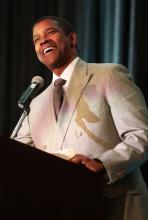
Hollywood star Denzel Washington, the son of a pastor, preached a sermon of gratefulness Nov. 7 to hundreds of members of the Church of God in Christ at their annual Holy Congregation in downtown St. Louis.
“I pray that you put your slippers way under your bed at night, so that when you wake in the morning you have to start on your knees to find them. And while you’re down there, say thank you,” he told the crowd at a $200-a-plate banquet at the Marriott St. Louis Grand Hotel to raise money for the denomination’s charity work.
“It is impossible to be grateful and hateful at the same time,” he said.
“We have to have an attitude of gratitude.”

Over 400 participants from all continents (barring Antarctica) gathered on Messiah College’s campus in Harrisburg, Pa., to further their understanding of Anabaptist teachings while exploring what it means to be a part of the global church during the 2015 Global Youth Summit, under the theme, “Called to Share: My Gifts, Our Gifts.” Participants engaged in deep learning through workshops led by professors and historians, connected to their history through historical Mennonite tours all over Pennsylvania where they visited museums and Mennonite churches and met Amish families, and tapped into their musical side with globally-infused worship.
My role as the North America representative for the summit (which coincided with the 2015 Mennonite World Conference) meant meeting with delegates on an individual basis — the delegates being representatives from global conferences. It meant hearing stories about home churches and struggles with governments, and discussions about theologically Anabaptist responses to violence and change in all four corners of the earth.
And, of course, it meant witnessing people randomly break out in song and dance. Both a boisterous drum circle and competitive games of Dutch Blitz lasted well into the night.
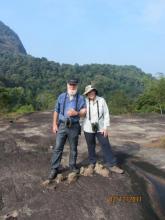
Influenced in her early 20s by the civil rights movement, Barbara learned about Sojourners during the time that she and her husband served in Tanzania with the Peace Corps. Experiences interacting with folks diverse in religious belief and race during this time profoundly influenced her understanding of faith and social justice. She shares that her life has been influenced by Catholics and Mennonites, pagans and Methodists, Anglicans, Quakers, Hindus, and Buddhists: “At the core, a lot of us on the planet are looking for the same thing: to get along with one another, to have enough to eat, [and] to be able to live with some measure of safety and security.”

I spoke with James Tufenkian, founder of Tufenkian Foundation which serves to promote social, economic, cultural and environment justice in Armenia as it recovers from its genocide. I asked him about his connection with Sojourners, and how his work and faith intersect.
Ariana Denardo (AD): How did you get connected with Sojourners, and why did you decide to become a donor?
James Tufenkian (JT): My brother, a retired pastor, and I were having a series of conversations about the involvement of the church in social issues. He mentioned Sojourners, so I visited the website, read the magazine, and got interested. I found Sojourners to be the best, maybe the only organization I know of that works on social justice as Christians living out Christ’s example. It was natural for me to want to support that in different ways, one of them being as a donor.
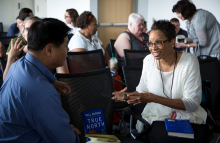
I think we’ve all been there: physically tired, emotionally battered, and spiritual frustrated. This combination of conditions often lead to the thought of wondering if anybody cares — not just for you, but for the things that you are passionate about. You may feel like the last person standing, the only one who has a sincere zeal for what you’ve been called to address. ...
The Summit provided a unique setting that brought together leaders from the business and urban communities, others from the front lines of inner city racial inequality protests, and rural communities of both national and international descent.
